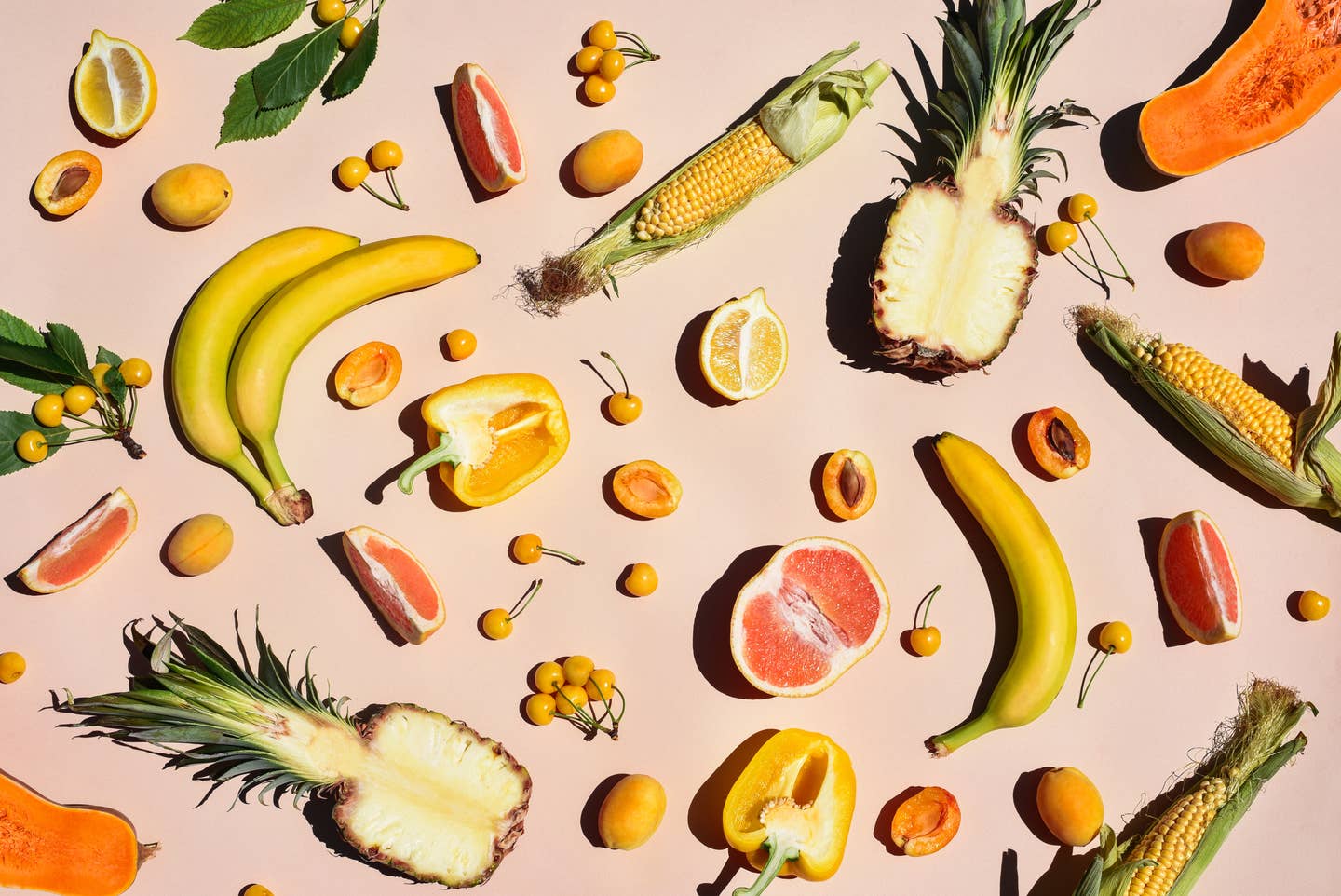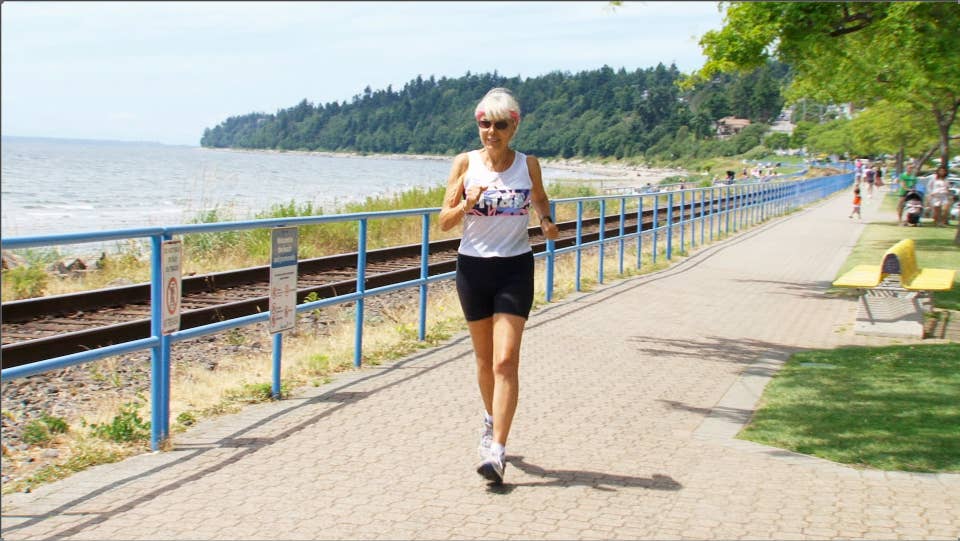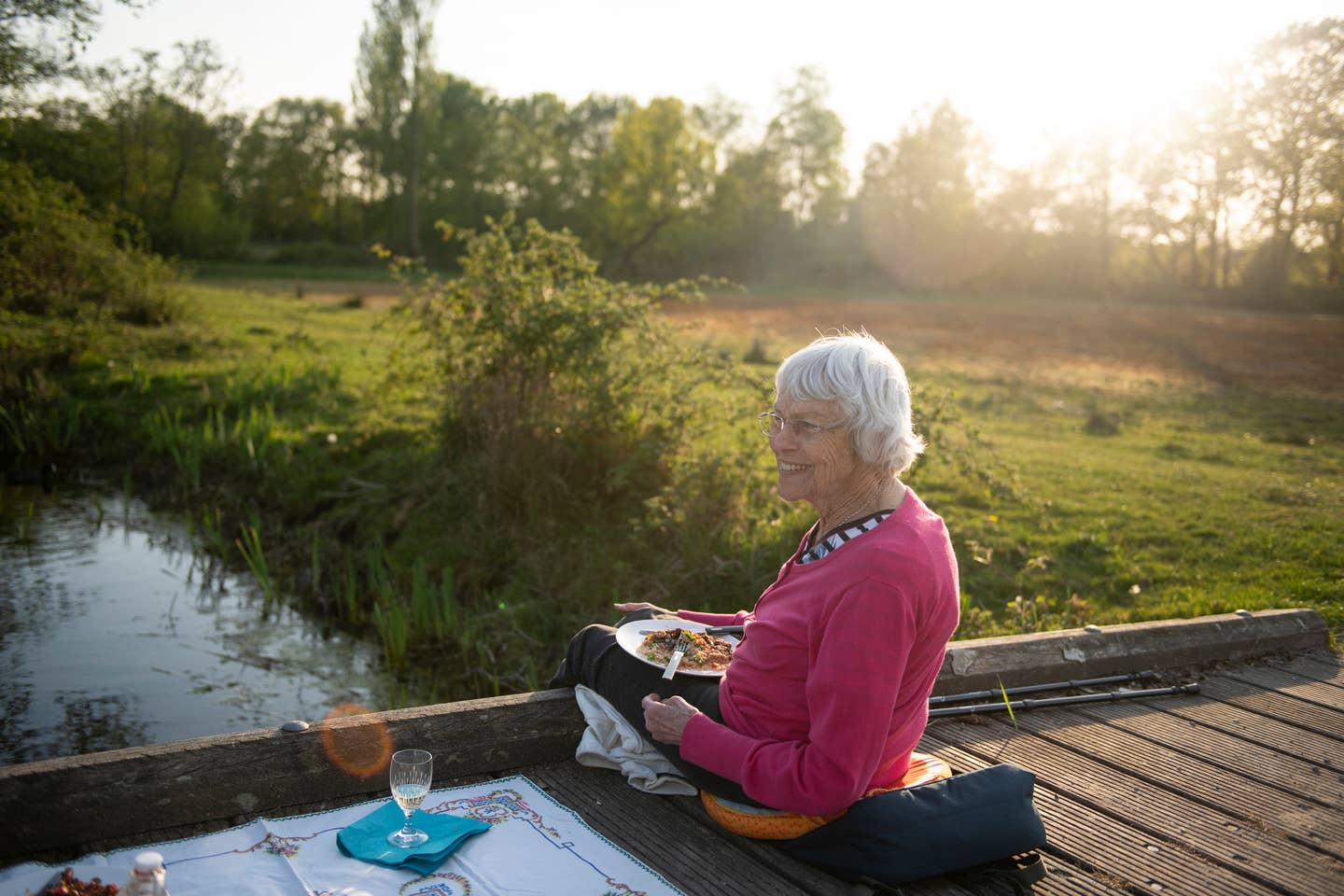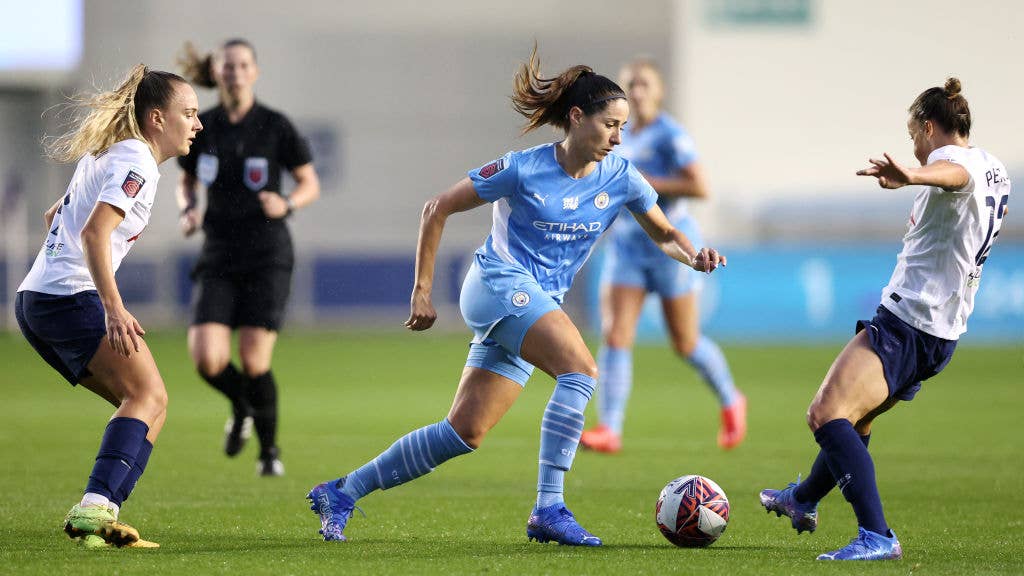
This Mom Kicked a Junk Food Addiction, Went Plant-Based & Lost 140 Pounds
"Processed food was my emotional outlet. I considered it to be my best friend and put it above anyone else." says 44-year-old Evon Dennis. It led her to become depressed, and at her highest, she weighed 250 pounds. She remembers being too embarrassed to go out, so instead, she would send her oldest daughter, then a teenager, to the grocery store to buy her next fix: Potato chips, sugary cereals, processed cheeses, and more. For Evon, it felt like her identity was taken over by being a junk food junkie. Now looking back, Evon wants to share her story of how she found help, went plant "exclusive" (all you consume are plants), and essentially saved her life. Today she weighs 110 pounds and is fit, happy and most of all, proud of the example she is setting her daughters, now 24 and 17 years old.
Food addiction is real, and Overeater's Anonymous can help
Evon tells the story of her darkest years, when her food addiction took over her life, until five years ago when she started to turn things around. Up until that point, year by year, her eating addiction progressed which is what happens with addiction: you need more and more of a fix to satisfy your urges, in order to get that high from your drug, in this case, junk food, cheese, and sugar. Evon recalls feeling overwhelmed and sad, especially knowing that she was raising her children around a mother who couldn't help herself. At her highest, she weighed 250 pounds. By 2015, she had had enough and knew she needed help. She researched her options and found Over Eater's Anonymous, where she discovered her struggles with food were not simply a matter of will power: She learned that her level of overeating was classified as an addiction, and it comforted her to know that she was not alone in her battle.
By attending group OA sessions, Evon was able to work on herself step by step. First, she cut out dairy which contains casein, an extremely addictive protein, which had been driving a powerful addiction to cheese, This helped her dull down her intense food cravings to other foods as well, like sweets and processed bags of chips.
Casein, the protein in cheese, contains opioids called casomorphins that are addictive
A note about casein: When people say "I'm addicted to cheese," they may be half-joking but there is some truth to it, according to Dr. Neal Barnard, founder of the Physicians Committee for Responsible Medicine (PCRM), who has written a book about cheese addiction, The Cheese Trap: How Breaking a Surprising Addiction Will Help You Lose Weight, Gain Energy, and Get Healthy. He calls casein "dairy crack," because the "dairy proteins in cheese can act as mild opiates. Fragments of casein protein, opioid peptides called casomorphins, attach to the same brain receptors as heroin and other narcotics. As a result, each bite of cheese produces a tiny hit of dopamine." When that rush subsides, it leaves your brain craving more, therefore you seek more cheese to get your fix.
Going plant-exclusive and ditching dairy helped Evon lose 40 pounds in four months
For Evon dairy was the last step in making a transition to a whole-food plant "exclusive". Years ago she had given up meat and seafood, so dairy was the final step. She had a "come to Jesus" moment when she decided to ditch dairy and go on what she won't call a "diet" but prefers to call a "live-it" since it was her choice to stop killing herself and instead choose a path that took her toward a healthier lifestyle, one that allowed her to lose weight and kick her food addiction, get healthy and lead an exemplary existence for her kids.
She dove into a dairy-free, processed food free plant "exclusive" and challenged herself to stay on track. "The challenge was difficult," she admits, but eating a plant exclusive "liveit" changed her life for good. "The weight started coming off immediately," and she felt more energized with processed foods out of her system. "I felt fantastic," she recalls, and the weight dropped off, 40 pounds in the first four months.
Trauma caused her to go off her plant-based "exclusive". Here's how she got back on track
Within the same year, Evon was doing well until she was faced with a family trauma, which sparked her to go off her healthy diet, and she found herself back at square one, fully in the thralls of food addiction all over again. Her long battle back left her depleted and feeling powerless, and depressed by the fact that she had gone back to her old ways. She was also feeling sick and had a nervous break-down landed in and out of the hospital, seemingly worse off than ever. Evon was emitted to the psychiatric unit and was diagnosed with mental illnesses, PTSD, anxiety, depression, and bipolar disorder. Still, she couldn't help but remember how good she felt when she had started eating salt-free, oil-free, flour-free, alcohol-free, sugar-free, whole food plant "exclusive." She resolved to get back on track. One day, just like that, she decided to relive those moments.
Evon marked the date of her fourth attempt to eat this way as her "live-it" since she chose to live, not die. It was January 2020, but she was more committed than ever this time. She was determined to make the switch stick, not only for herself but for her children. Within the first month, she felt like a new person. " I couldn't be happier, I felt free, and the weight started quickly coming off again" she remembers."I was 174 pounds at the beginning of this year, and in less than 8 months she got down to 110 pounds."
Evon shared her vegan journey with The Beet, including her secrets to success and motivation, and offering helpful advice for anyone struggling with food addiction. In the interview below, learn from Evon's challenges and how the power of a plant "exclusive" can help overcome life's biggest hurdles, by creating a path to "live-it!"
The Beet: Why did you go plant-based to kick your food addiction?
Evon Dennis: For my entire adult life, I struggled with overeating. I joined Over Eater’s Anonymous in 2015 for the first time, and that’s when I discovered my overeating was an addiction. It changed everything for me. I finally understood that my problem with overeating wasn’t my fault. At the beginning of 2017, I decided to cut dairy out to heal my food addiction. I already had stopped eating meat 14 years ago and stopped eating seafood in 2015.
By 2017, I was ready to cut out dairy and become entirely plant-based. I was nervous about taking that final step, so I created a challenge for myself: I would only eat the food I made from scratch. It was a massive deal for me because as a single mom of two girls, I relied on boxed, canned, and prepared foods to feed them because I had convinced myself I didn’t know how to cook. The challenge worked because it was so difficult; suddenly, cutting dairy out didn’t seem so hard!
TB: Did you learn anything about your relationship to food during your challenge?
ED: During the challenge, I was continually thinking about and craving processed food, and I wanted to figure out why that was. I hated feeling like I’m a prisoner of anything, person, or situation. I started researching, and I found so much information about refined food addiction. When I first stopped eating meat, my goal was to improve my health by eating more plants. I never forgot my initial plan, and once I realized that I was struggling with processed food addiction and over-eating, I was able to remember why I stopped eating meat in the first place. I had always wanted to eat plants, not just processed vegan junk food.
TB: What kind of results did you see after changing to salt, oil, flour, alcohol
sugar-free whole food plant exclusive?
ED: The weight started coming off immediately, and now that I have all these substances out of my system, I feel fantastic. I dropped 64 pounds in less than 8 months this year. When I first discovered this way of eating, at the beginning of 2017, I had lost 40, but then struggled to keep it off because I went through family trauma. I tried a few times between 2017 and the beginning of this year to eat this way again, but I committed myself fully to eating the way I do now at the beginning of this year. I was 174 pounds at the beginning of this year, and I’m now 110 pounds.
TB: How did your addiction affect your relationships?
ED: Processed food was my emotional outlet. I considered food to be my best friend and put it above anyone else. My children grew up seeing me like that, and at my worst, I’d send my oldest to the store to buy more junk food. When I would have an over-eating episode, I would be ashamed to go outside because I’d convince myself everyone who saw me would judge me for gaining weight. I was trying to drown out my feelings with processed foods, and I taught my children that. My children have born the brunt of my struggles of being around me at my worst, which keeps me inspired to stay well.
TB: What inspired you to re-commit to a plant-based lifestyle?
ED: I missed the freedom of not continually thinking about processed food. It was so painful to have to always think about food. Now, I have so much more energy and space in my brain to do incredible things: I just took my first lesson on how to fly a plane! I knew I wanted to get back to this kind of freedom.
TB: How did you make it stick the second time around?
ED: I did research on others who had successfully transitioned to a salt, oil, flour, alcohol sugar-free whole food plant exclusive. After all of my research, I felt like I had learned what I needed to fix my mind to eat this way successfully. One of the things I learned was the importance of starting my day off with leafy greens. I had seen research that showed that leafy greens were able to cut cravings, and that’s exactly what I needed to happen. I knew it was vital for me to fall in love with the natural taste of whole food plants. I also made sure to stay hydrated and stop focusing so much on people-pleasing.
To make such a significant life change, I knew I had to stop caring about other people’s judgments. The other big realization I had was that I needed to change the way I labeled food. I had to stop using words I had specific associations with for food, like “cheat days” or “falling off the wagon.” When I stopped using those kinds of judgment words, I finally could succeed in overcoming my addiction: I remembered that I’m just a human being and that there’s no such thing as perfection.
TB: What do you eat now?
ED: I like to call it a “live-it,” not a diet because I’m eating for my life! I eat salt, oil, alcohol, flour, and sugar-free whole food plant exclusively. I use the word plant “exclusive” instead of plant-based to make sure it’s clear that I’m just eating whole-food plants. I only eat fruit, veggies, whole grains, and legumes. I’m also a spontaneous person, so when I was getting back into cooking, I did a whole lot of playing around in the kitchen, just figuring out how to all these new things. I’m an excellent chef now! I found that once I’d abstained from sugar, salt, flour, alcohol, and oil for a certain amount of time, my cravings essentially went away. The only food cravings I feel now are related to good memories or environments. Now, I just eat whenever my body needs fuel.
TB: Do you have a mantra, words you live by?
ED: “All things are working for my good.” I love that one because what it means to me is: I’ve already been through so much, and if I’ve made it this far, I can keep going. I can keep pushing for myself, for my girls, because that’s what mama’s do.
TB: What advice would you give to someone struggling with food addiction?
ED: Be comfortable with yourself. It’s a journey we’re going to be on for the rest of our lives, so we might as well get comfortable. Make this journey your own; it’s not anybody else. Don’t let people interfere with your journey; it doesn’t have to look like anybody else’s. If you learn how to listen to yourself, you’ll learn when something isn’t serving you.
More From The Beet






